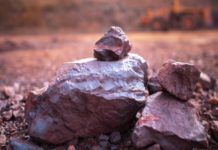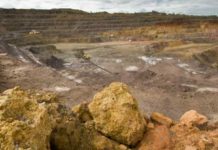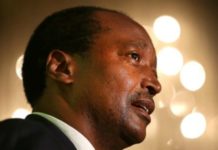
[miningmx.com] – EXXARO Resources booked a R1.6bn payment from Eskom for a shortfall in coal that should have been delivered to the heavily delayed Medupi power station – a penalty that gave a much-needed lift to the group’s coal division which otherwise performed poorly in the 2013 financial year.
Exxaro’s coal business reported a 32% increase in net operating profit of R2.78bn. Of this profit, nearly 60% was related to the Eskom penalty which represented a quantum increase over the R352m that was paid by Eskom to Exxaro in the mining group’s 2012 financial year.
The penalty was in lieu of cash flow from coal that should have been delivered to Eskom’s 4,750MW Medupi power station from Exxaro’s R10.3bn Grootegeluk Medupi Expansion Project (GMEP). Eskom and Exxaro revised the Medupi coal supply contract last year amid power station delays.
In the current 2014 financial year, another R1.6bn would be paid by Eskom to Exxaro, said Exxaro CFO, Wim de Klerk, who added that continued coal delivery shortfalls would call for further negotiations with Eskom.
“We planned to deliver 6 million tonnes a year (mtpa) this year,’ said De Klerk. “We know it will not happen. Hopefully in next month, we will give you that (supply) number,” he said. Eskom said last year that the commissioning of Medup’s first unit has been delayed until December.
“Stripping out the impact of the Medupi penalty shows that the underlying year-on-year performance was poor with operating profit down 30%,’ said Kieran Daly, an analyst for Macquarie Research of Exxaro’s coal division.
Exxaro’s coal operations comprised about 77% of the group’s core net operating profit of R3.6bn in the 2013 financial year, down from R7.6bn in the previous year. There was a consequent net cash outflow of about R1bn; net debt increased to R3.38bn from R2.2bn taking net debt to equity ratio to around 10%.
All in all, Exxaro Resources ” 2013 financial year was typified by portfolio restructuring and investment, as well as write-downs of assets. For instance, it dispensed with its base metals business, Zincor and New Clydesdale Colliery, a thermal coal business.
On the growth side, Exxaro invested about R3.4bn in new projects including R1.8bn completing its Grootegeluk Medupi Expansion (GMEP) and R1.6bn in Mayoko iron ore project.
Impairments were suffered on Zincor as well as Tronox, the New York-listed mineral sands business in which Exxaro Resources has a stake. There has been speculation that Exxaro Resources may not take up its options to lift its stake in Tronox to about 50% from the current 44% holding.
“We are trying to understand our position and take a view on Tronox before we make a decision,” said Sipho Nkosi, CEO of Exxaro Resources.
“I saw some comments that we don’t know what to do,’ said Nkosi. “We know what we want to do, but we are reviewing our numbers and deciding what to do on that front,’ he said.
Commenting at the group’s results presentation in Johannesburg, Nkosi said that the R53bn group was not “in survival mode’, but intended to grow.
“We have to look after your money,’ he said to shareholders. “Therefore, we’ve got to win. We are not going to be on the survival mode.’
The group signalled its confidence in its business fundamentals paying a R3.15 cent per share final dividend which took the total dividend to R5.50/share, representing a 10% increase year-on-year.
Kumba Iron Ore, in which Exxaro Resources has a 19.98% stake, contributed R2.6bn in dividends, a 30% year-on-year improvement, but the group also participated in some R638m losses recorded by its mineral sands investment Tronox.
No additional funds would be pumped into Exxaro’s blue-sky Mayoko iron ore project in the Republic of Congo. The group is expecting to finalise the paperwork on a mining convention in the current interim period and would take a view on the feasibility of the project thereafter.
“From now onwards, we are going to be able to work on numbers,’ he said. “Please wait and be patient. We are trying to ensure that we don’t waste your money by deploying capial where it is not necessary,’ Nkosi said.
De Klerk said there were plans to grow the group’s sources of capital, but declined to provide details. “We are looking at options to diversify the sources of our funding. We will keep you informed of developments,’ he said.











